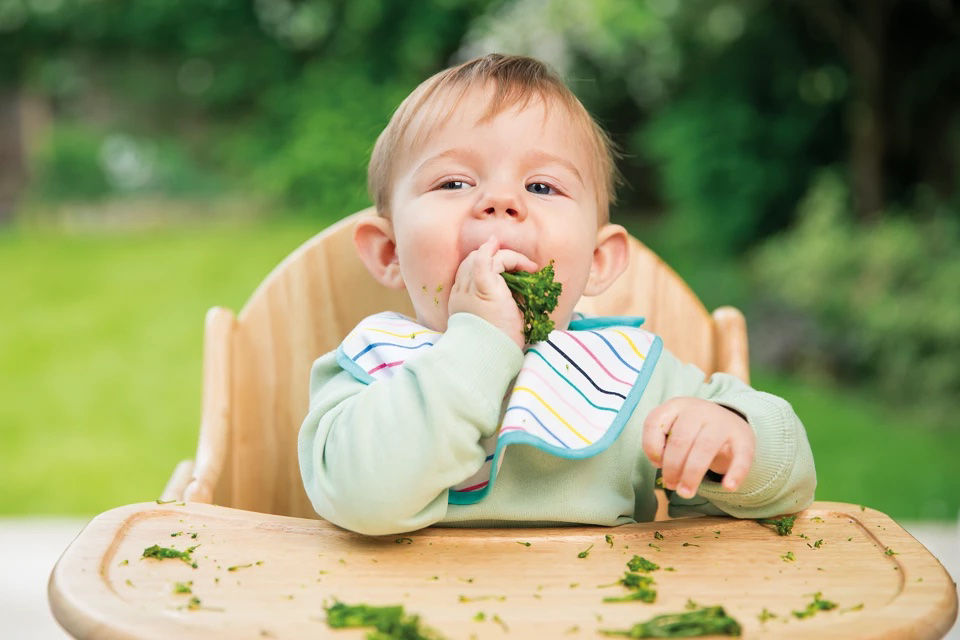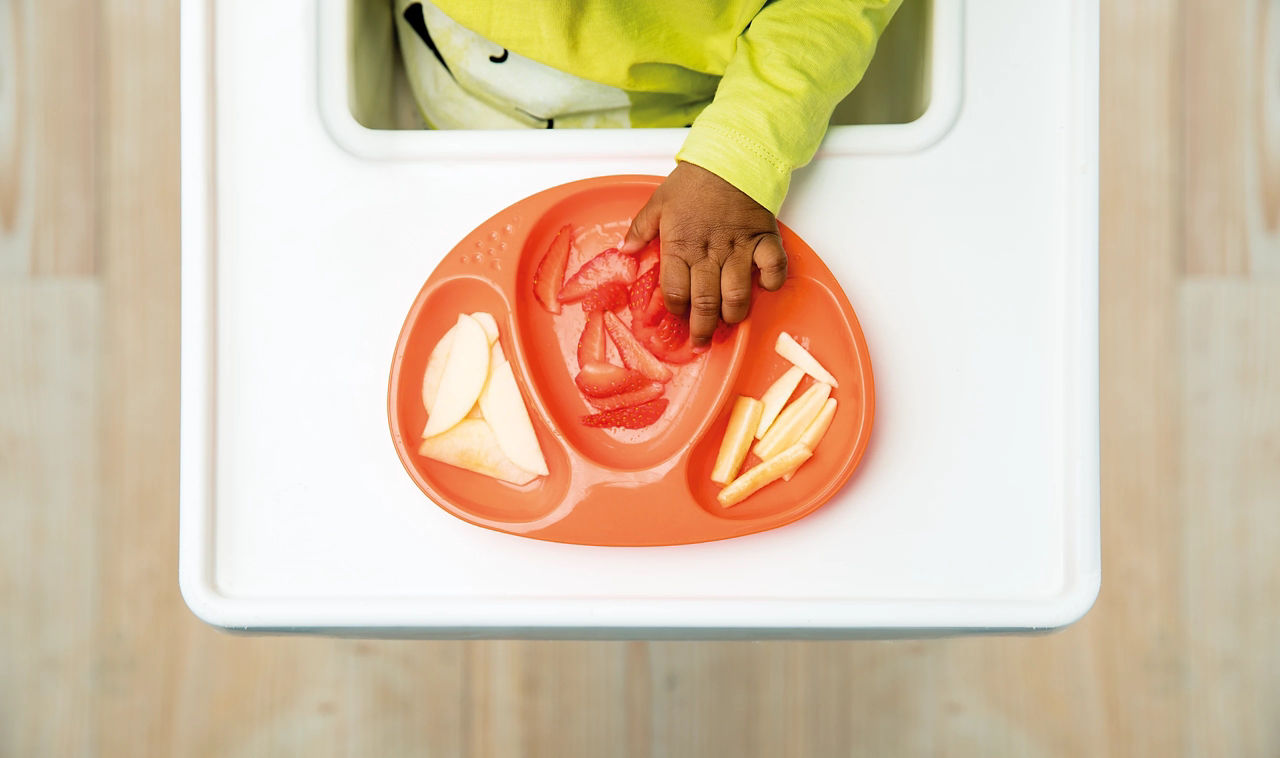Free weaning plan - Register here
Discover which foods to include in your little one’s diet, how to introduce foods that could trigger allergic reactions safely as well as which foods to avoid offering your baby.
The best foods to include
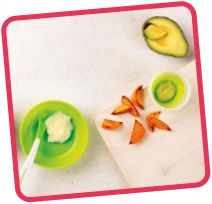
Fruit & vegetables
To start with, stick to single veggies like carrots, peas or broccoli. Research has shown that giving your baby more savoury flavours rather than sweet tastes to begin with can really help to shape their preferences, and teach them to love veggies for life1. Once they’ve mastered the art of simple veggies you can start to introduce a whole range of yummy fruit and vegetables.
Whether they’re fresh, frozen or tinned, fruit and veg contain all kinds of important vitamins and minerals for your baby’s development. The more colours in their bowl, the wider the variety of nutrients they’ll be getting. If you’re using fresh fruit and veg, choose the ripest, freshest you can find. Then wash it, peel as necessary and take care to remove any seeds or stones.
Once your little one’s happily chomping away on a range of delicious fruit and vegetables, it’s time to work towards introducing a more varied diet by including other food groups too…
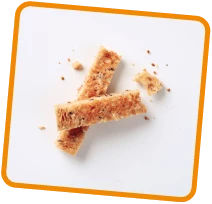
Starchy foods
Starchy carbohydrates like bread, cereal, pasta, rice and potatoes give your little one plenty of energy. They’re a great basis for every meal and a good choice for snacks, too.
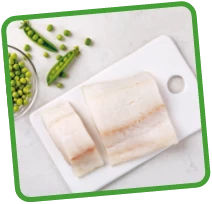
Meat, fish and vegetarian alternatives
This group includes meat, fish, eggs, pulses and nuts (served ground or as nut butters only), which provide protein, iron and other vitamins and minerals. Once you’ve started to introduce them to your baby, you can offer them once a day and this can increase to 2 portions as they approach their first birthday2. Find out how to prepare meals safely. Or how to give your baby a healthy, balanced diet if they are vegetarian or vegan.
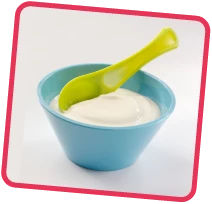
Milk, cheese and yogurt
Rich in calcium, dairy foods are important for the health of your baby’s teeth and bones, which are growing at an incredible rate. It’s best to choose full-fat varieties because they provide energy for all that growing and developing. Once your baby is a year old, it’s recommended that they have 3 portions of dairy foods every day3.
Introducing foods that are more likely to trigger allergic reactions
As your little one moves on from first weaning foods, they’ll continue to expand their diet with exciting new foods. Be aware that some foods are more likely to trigger an allergic reaction. While it’s fine to introduce these foods from around 6 months – it’s best to introduce them one at a time and in small amounts to start with.

Foods that may trigger an allergic reaction:
- Cow's milk and other milk based products
- Cereals containing gluten (including wheat, barley and rye)
- Eggs
- Fish
- Nuts & peanuts (serve ground or crushed only)
- Soya
- Shellfish (serve thoroughly-cooked)
- Sesame and other seeds (serve ground or crushed only)
- Mustard
- Celery
- Lupin (a type of legume)
- Sulphur dioxide (sometimes used as a preservative for dried apricots and other dried fruits)
Your little one is more likely to develop an allergy if you have a family history of asthma, eczema, hay fever or a particular food allergy4. If any of these apply, speak to your health visitor or GP before you start weaning your baby.
Foods to avoid when weaning
Some foods aren’t safe your little one until a certain age. Use the table below for a quick overview, then read on for more comprehensive advice.
| Before 12 months old | Before 5 years old |
|---|---|
| Honey | Whole nuts |
| Lightly cooked or raw eggs that don’t carry the red lion mark | Rice milk |
| Mould-ripened soft cheese or unpasteurised cheese | |
| Shark, marlin and swordfish | |
| Raw shellfish | |
| Tea and coffee |
Salt
Your baby’s kidneys are still developing and can only cope with a small amount of salt. During their first year, they need no more than 1g of salt per day5 and many adult foods contain a lot more than this. If you’re cooking for the whole family, avoid using salt while cooking – let the grown-ups add their seasoning once the food is served. It’s also a good idea to avoid using stock cubes and gravy powder, which tend to have a high salt content. Watch out for products with added salt too!
Sugar
Lots of foods are naturally sweet, including breast milk, formula milk, all fruits and some vegetables. Beyond those, your baby doesn’t need extra sugar in their diet. There’s no need to add sugar to your baby’s food, and you should try to avoid offering foods and drinks with added sugar or sweeteners.
Low-fat foods
Fat provides essential energy in the form of calories, and with all that fascinating development going on, babies and toddlers need plenty of it. For that reason, full-fat milk, and dairy products are recommended until at least their second birthday.
- British Nutrition Foundation. Complementary feeding: Vegetables first, frequently and in variety. [Online]. 2016. Available at https://onlinelibrary.wiley.com/doi/epdf/10.1111/nbu.12202 [Accessed October 2019]
- British Nutrition Foundation. Infant nutrition: Stage 3 (around 9-12 months) [Online]. 2018. Available at: https://www.nutrition.org.uk/nutritionscience/life/infant-nutrition.html?start=6 [Accessed: January 2020]
- British Nutrition Foundation. 5532 a-day. Perfect portions for little tums (1-4 years) [Online]. 2019. Available at: https://www.nutrition.org.uk/attachments/article/1253/BNF%205532%20Leaflet_2019.pdf [Accessed October 2019]
- Asthma UK. Why do people get asthma? [Online]. Available at: https://www.asthma.org.uk/advice/understanding-asthma/causes/ [Last reviewed October 2018. Next review due October 2021]
- Scientific Advisory Committee on Nutrition. Salt and Health. [Online]. 2003. https://assets.publishing.service.gov.uk/government/uploads/system/uploads/attachment_data/file/338782/SACN_Salt_and_Health_report.pdf [Accessed October 2019]
Last reviewed 30/07/2020
Do not leave your little one unattended when eating and drinking
Need free advice with a smile? Get in touch with our dedicated Care team.
Ask us a question (8am - 8pm Monday to Friday, 10am - 4pm Weekends)
Messenger
Contact us on Facebook (10am - 10pm, 7 days a week)
Call us
Call us on 0800 977 8880 (8am - 8pm Monday to Friday)
FAQs
Get answers to your most frequently asked questions

